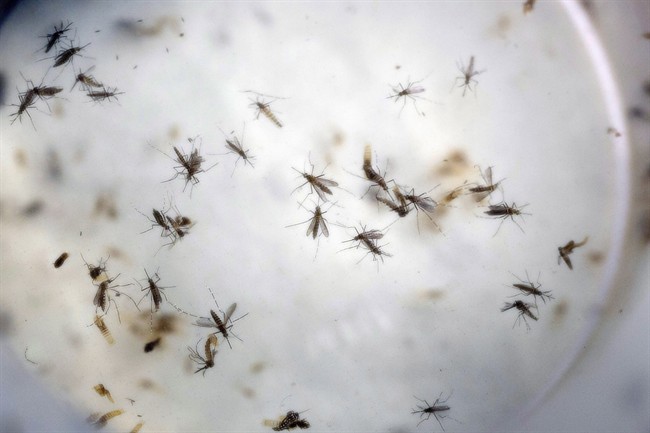TORONTO — The first confirmed case of Zika virus has been identified in Ontario in a person who travelled to Colombia, but the province’s chief medical officer of health says the risk to Ontarians remains low.

“On Tuesday, Public Health Ontario received positive test results for Zika virus for an individual who had travelled to South America,” Dr. David Williams said in a release.
“This is the first confirmed case of Zika virus infection in Ontario.”
This marks the fifth confirmed case of the virus in Canada — with two people in British Columbia, one in Alberta and another case in Quebec, according to Canada’s chief public health officer.
“The patient travelled to Colombia. The patient is not pregnant,” said Joanne Woodward Fraser, from Ontario’s Ministry of Health and Long-Term Care. She added that for confidentiality reasons no further details on the traveller could be provided.
Like dengue, West Nile and yellow fever, Zika virus is a mosquito-borne tropical disease, meaning mosquitoes transmit the disease to humans.
READ MORE: Should Canadians worry about Zika virus?
Chief Medical Officer of Canada Dr. Gregory Taylor told Global News on Jan. 29 the risk of the mosquito-borne virus to Canadians is “very, very low.”
All five cases involved Canadians who travelled to countries where the virus is actively circulating.
- Retired Quebec teacher buys winning lottery ticket at last minute, wins $40M
- N.B. election: Higgs went to ‘very dark place’ with Liberal joke, opponent says
- NDP want competition watchdog to probe potential rent-fixing by landlords
- Jasper mayor says CN Rail relocation will be devastating: ‘Deeply disappointed’
Last month, the World Health Organization said Zika virus will touch all of the Americas, except for Canada and Chile.
READ MORE: 5 things Canadians need to know about Zika virus

Get weekly health news
There hasn’t been a single reported case of locally acquired Zika virus in Canada.
Williams said the province has taken steps to ensure healthcare workers are prepared in the event that a traveller returned to Ontario who is suspected of carrying the virus.
“That includes working with the Public Health Agency of Canada to ensure that individuals presenting with symptoms are tested as quickly as possible,” he said.
“We have also been working closely with health professionals and labs in Ontario to ensure that they have the most up to date information about the virus and how to care for individuals concerned about possible exposure.”
READ MORE: What pregnant women need to know about Zika virus and travel
Williams said the Public Health Agency of Canada, Public Health Ontario, the U.S. Centers for Disease Control and Prevention, the World Health Organization and other national and international partners have been working with the Ontario Ministry of Health and Long-Term Care to monitor the virus.
He added that any individuals who have traveled to countries affected by Zika virus and are concerned that they might have contracted it should speak with their health-care provider, who can advise them if they need to be tested.
Testing for the Zika virus is currently being performed by Public Health Ontario and the National Microbiology Laboratory in Winnipeg.
READ MORE: Canadian scientists testing Zika to see if virus can infect native mosquitoes
“The risk to Ontarians remains very low, as the mosquitoes known to transmit the virus are not established in Canada and are not well-suited to our climate,” Williams said.
Williams also recommended that pregnant women, and those considering becoming pregnant, should discuss their travel plans with their doctor to assess risks and consider postponing travel to areas where the virus is circulating in the Americas.
The scientific community is trying to unravel if and how the virus transmits through blood transfusions, sexual intercourse and even from mother to baby.
READ MORE: Zika virus: What doctors know about how it potentially spreads
Health officials in El Salvador, Brazil, Jamaica, Ecuador, Honduras and Colombia told residents to stave off pregnancy until doctors better understand if the infection tampers with brain development in infants.
So far, it’s been linked to a 20-fold increase in a rare defect called microcephaly in babies, in which the newborns are born with irregularly small heads and underdeveloped brains.
“It’s an association of microcephaly. It’s an association that hasn’t been proven yet,” Taylor reminded Canadians on Jan. 29. “We don’t know what the real risk is.”
READ MORE: Canadian pregnant women who’ve visited Zika-affected countries should see their doctor
The Public Health Agency of Canada issued its own public health notice and travel health notice. It upped its travel recommendations, too.
“It is recommended that pregnant women and those considering becoming pregnant discuss their travel plans with their health care provider to assess their risk and consider postponing travel to areas where the Zika virus is circulating in the Americas,” the PHAC advisory says.
The ministry said it would continue to update Ontarians and health care providers on the status of Zika virus as new information is received from the Public Health Agency of Canada, World Health Organization, Pan American Health Organization and U.S. Centres for Disease Control and Prevention.
With files from Carmen Chai








Comments